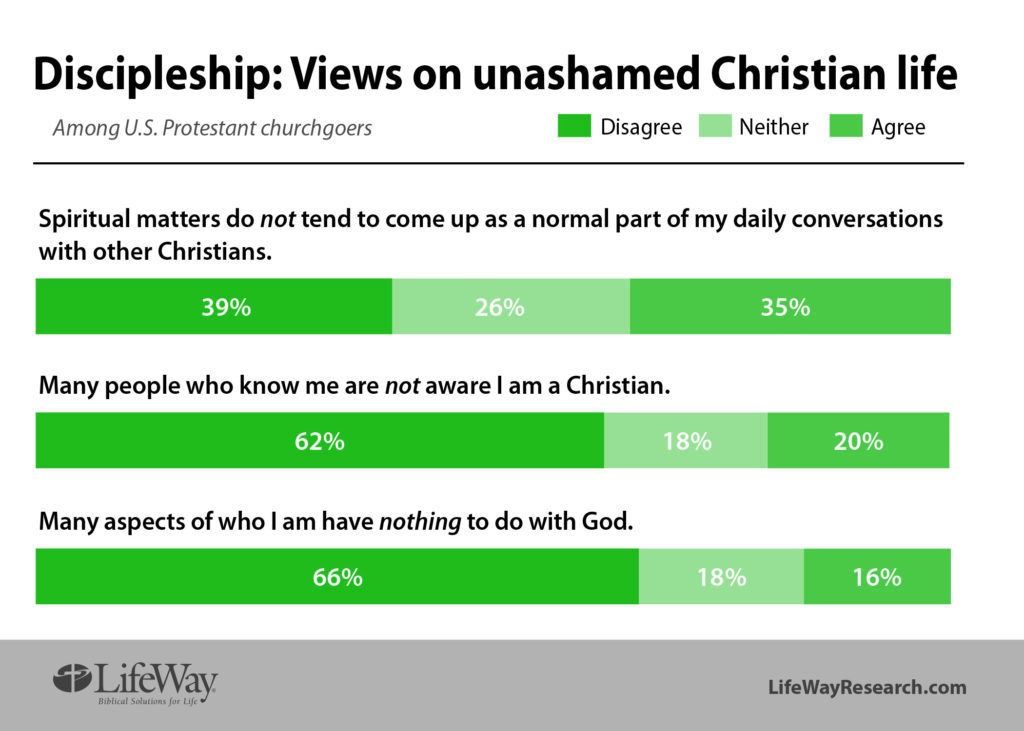Spiritual topics aren’t a part of regular conversations with fellow believers for many Protestant churchgoers, but most seem at least somewhat confident others know they’re a Christian.
The 2019 Discipleship Pathway Assessment study from Nashville-based LifeWay Research found those who regularly attend Protestant churches are split on how visible and pervasive their faith is in their daily lives.
The study identifies living an unashamed life as one of eight signposts that consistently show up in the lives of growing Christians.
“In an increasingly secular culture, fewer people assume you are a Christian,” said Scott McConnell, executive director of LifeWay Research. “Disciples now must decide if their identity in Christ is important enough to them to bring up in conversations.”

SPIRITUAL CONVERSATIONS
Fifteen percent of Protestant churchgoers strongly assert that matters of faith are a part of their regular conversations with fellow believers.
In total, 39% disagreed with the statement: “Spiritual matters do not tend to come up as a normal part of my daily conversations with other Christians.”
Around one quarter (26%) aren’t sure, while 35% agree that when they talk with other Christians, religious issues don’t usually come up.
Females (17%) are more likely than males (11%) to strongly indicate they regularly have conversations with other Christians about spiritual matters.
Hispanics (19%) and African Americans (18%) are more likely than whites (13%) to strongly affirm faith issues come up in their daily conversations with other Christians.
Evangelical Protestants (17%) and black Protestants (15%) are also more likely than mainline Protestants (7%).
The youngest adult churchgoers (18–34) are the least likely to strongly indicate spiritual matters are topics of daily conversations with other Christians (9%).
“It is striking that so many Protestant churchgoers don’t talk to each other about the very thing that is supposed to unite them,” said McConnell. “And the younger generation either did not observe it growing up, or it was not done in a way they want to emulate.”
VISIBLE FAITH
Most Protestant churchgoers say others know they are Christians, but fewer are very confident in that perception.
Almost two-thirds of Christians (62%) disagree with the statement, “Many people who know me are not aware I am a Christian,” while more than a third (36%) strongly disagree.
Two in 10 agree and 18% neither agree nor disagree.
Women are more confident that others know of their faith. More than 2 in 5 females (42%) strongly indicate people who know them are aware they are a Christian compared to 27% of males.
African Americans (44%) are the ethnicity most likely to express strong confidence in others knowing of their faith.
Black Protestants (41%) and evangelical Protestants (37%) are more likely than mainline Protestants (26%) to strongly indicate those who know them know about their being a Christian.
“Far more people identify as a Christian on a survey than they do among their acquaintances,” said McConnell. “One in 5 churchgoers is missing the truth found in Matthew 10:32 that acknowledging Jesus before men is tied to whether Jesus will acknowledge us before his Father.”
PERVASIVE FAITH
Most Protestant churchgoers believe God is relevant to every part of their life and identity.
Two-thirds (66%) disagree with the statement, “Many aspects of who I am have nothing to do with God,” with 44% strongly disagreeing.
Fewer than 1 in 5 aren’t sure (18%). Similar numbers agree (16%).
Half of female churchgoers (51%) strongly disagree many aspects of who they are have nothing to do with God compared to 35% of males.
African American churchgoers (56%) and churchgoers living in the South (49%) are some of the most likely to strongly disagree.
Black Protestants (54%) and evangelical Protestants (46%) are more likely to strongly disagree than mainline Protestants (29%).
Younger churchgoers (18–34) are the least likely to strongly disagree (34%).
“While most churchgoers avoid compartmentalizing their faith, it can be challenging to walk with God in every area of life,” said McConnell. “The majority of churchgoers indicate there are more aspects of who they are that can be better connected to God.”
Used by permission of LifeWay Research.

